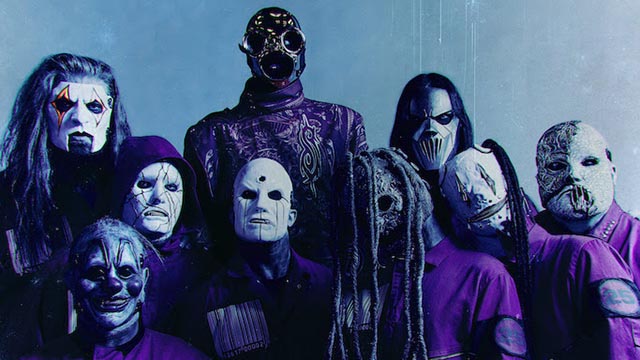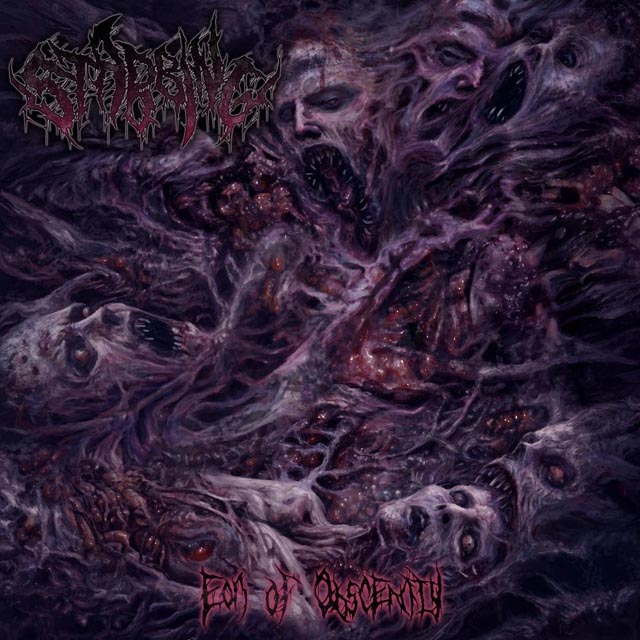 We’re just starting to get used to writing “2014” on stuff instead of 2013. And while it’s looking like it’s going to be a good year for metal, 2004, which doesn’t seem all that long ago, was a pretty groundbreaking year for heavy music. Be it career-defining albums from bands, side projects from mainstream musicians, or a scene and subgenre (Massachussetts metalcore) coalescing to reach critical mass, a lot of influential albums were released a decade ago. And while album sales had already peaked several years prior, a ton of people were still buying enough metal for it to have commercial as well as critical success. So with that in mind, in no particular order, here are some of the best and most influential metal and hard rock albums that were released in 2004.
We’re just starting to get used to writing “2014” on stuff instead of 2013. And while it’s looking like it’s going to be a good year for metal, 2004, which doesn’t seem all that long ago, was a pretty groundbreaking year for heavy music. Be it career-defining albums from bands, side projects from mainstream musicians, or a scene and subgenre (Massachussetts metalcore) coalescing to reach critical mass, a lot of influential albums were released a decade ago. And while album sales had already peaked several years prior, a ton of people were still buying enough metal for it to have commercial as well as critical success. So with that in mind, in no particular order, here are some of the best and most influential metal and hard rock albums that were released in 2004.
Mastodon, Leviathan
Release Date: August 31
Why it matters: Mastodon didn’t arrive fully formed, but they were well on their way. The band’s 2002 debut full length, Remission, put the band on the metal map, but it wasn’t until their sophomore album, a concept album based on Herman Melville’s Moby Dick, that it became apparent what a force the Atlanta quartet were. A year later, the band signed with Reprise Records, and while the band have evolved from the extreme band they were on Remission to a thinking man’s prog band, Leviathan splits the difference between the extremism of their debut and the full-on proggy goodness of their later work and the Melvins-like groove that’s always been an undercurrent of their sound. As a result, it was during the touring for this album that they went from a cult band to a band that would become one of the most influential bands of the past decade.
 Lamb Of God, Ashes Of The Wake
Lamb Of God, Ashes Of The Wake
Release Date: August 30
Why It Matters: The Richmond band’s fourth album was their major label debut, and followed the previous year’s As the Palaces Burn as the band’s one-two combo of heavy music. This was the album that truly established them as the standard-bearers of the New Wave of American Heavy Metal, and a band with a devoted-enough fanbase that was solid enough to open for Slayer, which they would do on 2006’s Unholy Alliance tour. It was also the first time the band worked with Machine, who they would team up with again two years later for Sacrament. With the Iraq war still raging, songs like “The Faded Line,” the title track and the instant classic “Now You’ve Got Something to Die For” were both timely and timeless, while “Laid To Rest” will be one of the band’s signature songs for years to come.
Release Date: September 21
Why It Matters: For a while there, it seemed like the Massachusetts metalcore scene was going to take over the world. By the time Shadows Fall’s third full length, 2002’s The Art of Balance, was released, the band were already pretty established, but nobody was ready for The War Within to be as popular as it was. Debuting at #20 on Billboard‘s charts, the album remains Century Media’s biggest-selling album, having sold over 300,000 copies to date. Combining the band’s Masscore fan base with a more hard rock and ’80s metal dynamic, courtesy of Jon Donais’ and Matt Bachand’s shredding guitars and Donais melodic vocals to complement dreadlocked frontman Brian Fair’s bark, songs like “What Drives the Weak” and “The Power of I and I” were instant classics that still hold up a decade later.
 Slipknot, Vol. 3: (The Subliminal Verses)
Slipknot, Vol. 3: (The Subliminal Verses)
Release Date: May 25
Why It Matters: While Slipknot’s debut instantly established the band as a nu-metal standard bearer, they followed it up with Iowa, which was pretty much a middle finger to everyone. It was louder, heavier and faster than the first album, and with song titles like “People = Shit” and “Disasterpiece,” it was uncompromisingly heavy. It still went platinum. Three years later, the band convened with Rick Rubin for their third album. Stone Sour had released an album in the interim, with Joey Jordison and Shawn Crahan doing side projects as well. The result of this was their most varied album to date, with acoustic-led songs like “Vermillion Pt. 2” and “Circle” butting up alongside heavier tracks like “Pulse of the Maggots” and “The Blister Exists.” There were also tracks like “Duality” and “Before I Forget” that gave the band radio hits for the first time in their career. Essentially, this was the successful album that would serve as the blueprint for All Hope is Gone, and it’ll be interesting to see if or how its influence carries over to their fifth album.
Release Date: 2004
Why It Matters: Last year, Dave Grohl released Sound City: Reel to Real, a film and album documenting the California studio where he’d worked on Nevermind back when he was only the drummer of Nirvana However, that wasn’t the first time he collaborated with some of his favorite musicians to make an album. Lemmy, Venom’s Cronos, Wino, Max Cavalera and more collaborated with Grohl on Probot, which was a chance for him to play with some of the musicians that influenced him. It was pretty much the first time Grohl actually showed that he was more than just the Nirvana drummer-turned commercially successful active rock frontman, and while many can talk about metal and hardcore influencing them, it was a pretty unprecedented move for someone like Grohl to go ahead and record an album with them.
 Killswitch Engage, The End of Heartache
Killswitch Engage, The End of Heartache
Release Date: May 11
Why It Matters: Alive or Just Breathing had helped establish Killswitch Engage, even after that album’s vocalist, Jesse Leach, left the band. Enter Blood Has Been Shed’s Howard Jones. It’s tough to build on your success with a new singer, but Killswitch was able to do so with Jones, who was able to channel both the screaming and melodic parts that his predecessor had. The End of Heartache sold 38,000 copies in its first week, and went on to become the band’s first gold album. And not only was it the first album to feature Jones, but it was the first one to feature Adam Dutkiewicz on guitar (he’d been playing drums).
Machine Head, Through the Ashes of Empires
Release date: April 20 (in North America)
Why It Matters: Technically, this came out internationally on December 16, 2003. However, after Roadrunner Records’ U.S. department finally resigned the band, Through the Ashes of Empires came out in North America on April 20, 2004 (an ordeal Robb Flynn as detailed in his online journals). And the release proved to be an important one for Machine Head. Prior to making Through the Ashes of Empires, Machine Head made two “mainstream” albums that ended up alienating fans and critics. Furthermore, Roadrunner had dropped them completely following the lackluster reception of Supercharger. Thankfully for Machine Head, fans were more than receptive to the heavier direction they took on Through the Ashes of Empires. If it was for that particular album, Machine Head would’ve slipped into metal obscurity rather than become one of the leading bands in today’s metal scene.
 The Dillinger Escape Plan, Miss Machine
The Dillinger Escape Plan, Miss Machine
Release Date: July 20
Why It Matters: While Dimitri Minakakis was an integral part of The Dillinger Escape Plan’s beginnings, it wasn’t until they recorded Irony is a Dead Scene EP with Mike Patton following his departure that those beyond the technical mathcore scene’s ears perked up. Greg Puciato had been in the band by then, and Miss Machine was the most experimental album the band released. “Panasonic Youth,” “Baby’s First Coffin” and “”Sunshine the Werewolf” were as fast, heavy and spazzy as anything the band had released, and Puciato was an extremely good fit for that. However, the Patton influence rubbed off on the band with songs like “Setting Fire to Sleeping Giants” and “Unretrofied,” which were downright melodic. The schizophrenia of the band has continued on to this day, with Ben Weinman’s frantic guitar work being complemented by Puciato’s vocals.
Release Date: October 19
Why It Matters: There’s no doubt about – Isis second full-length, 2002’s Oceanic, was their masterpiece. It was there that they found the middle ground between being a Neurosis imitator and a post-rock band like Explosions in the Sky. But it was on Panopticon that they got comfortable with that sound and expanded on it. It also was the first time the band worked with Tool, as bassist Justin Chancellor appeared on “Altered Course.” This was the sound of shoegaze and hardcore coming together, and as anyone that’s listened to Deafheaven can attest, those are two sounds that fit together pretty well.
Release date: September 7 (in North America)
Why It Matters: Released in September of 2014 (August 30 in Europe), Master Of The Moon was at the time just another solid album from Ronnie James Dio. However, Dio’s tenth album would turn out to be the singer’s last studio album with his solo band. Dio ended up reuniting with his Black Sabbath bandmates to form Heaven & Hell in 2007, which found him touring and recording with the group until his death from stomach cancer in 2010. While his legacy will always live on (and reissues and live albums will continue to be released), Master Of The Moon technically marks the final chapter of Dio.
Release date: June 8
Why It Matters: “Really? Velvet Revolver made it onto this list?,” you may be asking yourself. Well, no matter how you feel about Velvet Revolver, there’s no denying how massive their debut album was at the time. For starters, it was an album made by members of Guns N’ Roses (including Slash) and Stone Temple Pilots singer Scott Weiland. But on top of that, Contraband turned out to be pretty damn good. Sure, maybe not as good as their members’ previous bands, but it was packed with hit singles like “Slither” and “Fall To Pieces.” The album even debuted at #1, selling 256,000 copies in its first week of release, and gave way to numerous headlining tours in arenas. It was the type of success that the hard rock community hadn’t seen in a while. Unfortunately for VR, their follow up Libertad wasn’t that well received, and the group still hasn’t found a replacement for Weiland (considering it’s been six years now, we’d be more surprised to see the band back in action). Still, if Velvet Revolver was still active today, fans would likely look back at Contraband more fondly.
















